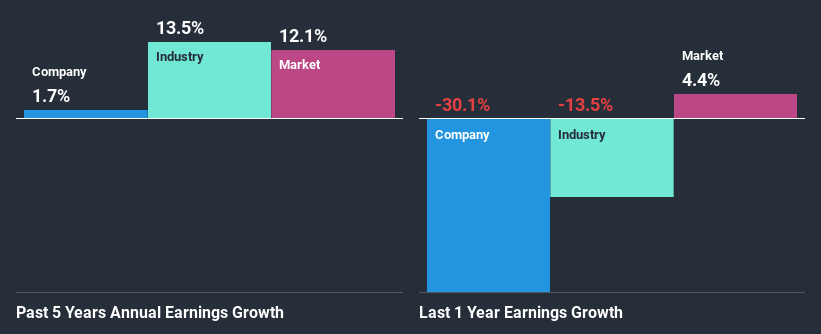Do Fundamentals Have Any Role To Play In Driving MSC Industrial Direct Co., Inc.'s (NYSE:MSM) Stock Up Recently?
MSC Industrial Direct's (NYSE:MSM) stock up by 9.8% over the past three months. We wonder if and what role the company's financials play in that price change as a company's long-term fundamentals usually dictate market outcomes. In this article, we decided to focus on MSC Industrial Direct's ROE.
ROE or return on equity is a useful tool to assess how effectively a company can generate returns on the investment it received from its shareholders. In simpler terms, it measures the profitability of a company in relation to shareholder's equity.
See our latest analysis for MSC Industrial Direct
How To Calculate Return On Equity?
ROE can be calculated by using the formula:
Return on Equity = Net Profit (from continuing operations) ÷ Shareholders' Equity
So, based on the above formula, the ROE for MSC Industrial Direct is:
17% = US$188m ÷ US$1.1b (Based on the trailing twelve months to February 2021).
The 'return' is the yearly profit. That means that for every $1 worth of shareholders' equity, the company generated $0.17 in profit.
What Is The Relationship Between ROE And Earnings Growth?
So far, we've learned that ROE is a measure of a company's profitability. We now need to evaluate how much profit the company reinvests or "retains" for future growth which then gives us an idea about the growth potential of the company. Assuming everything else remains unchanged, the higher the ROE and profit retention, the higher the growth rate of a company compared to companies that don't necessarily bear these characteristics.
MSC Industrial Direct's Earnings Growth And 17% ROE
At first glance, MSC Industrial Direct seems to have a decent ROE. On comparing with the average industry ROE of 9.9% the company's ROE looks pretty remarkable. However, we are curious as to how the high returns still resulted in flat growth for MSC Industrial Direct in the past five years. Therefore, there could be some other aspects that could potentially be preventing the company from growing. For example, it could be that the company has a high payout ratio or the business has allocated capital poorly, for instance.
Next, on comparing with the industry net income growth, we found that MSC Industrial Direct's reported growth was lower than the industry growth of 13% in the same period, which is not something we like to see.
Earnings growth is an important metric to consider when valuing a stock. What investors need to determine next is if the expected earnings growth, or the lack of it, is already built into the share price. By doing so, they will have an idea if the stock is headed into clear blue waters or if swampy waters await. Has the market priced in the future outlook for MSM? You can find out in our latest intrinsic value infographic research report.
Is MSC Industrial Direct Efficiently Re-investing Its Profits?
The high three-year median payout ratio of 51% (meaning, the company retains only 49% of profits) for MSC Industrial Direct suggests that the company's earnings growth was miniscule as a result of paying out a majority of its earnings.
Additionally, MSC Industrial Direct has paid dividends over a period of at least ten years, which means that the company's management is determined to pay dividends even if it means little to no earnings growth. Our latest analyst data shows that the future payout ratio of the company is expected to rise to 63% over the next three years. Still, forecasts suggest that MSC Industrial Direct's future ROE will rise to 25% even though the the company's payout ratio is expected to rise. We presume that there could some other characteristics of the business that could be driving the anticipated growth in the company's ROE.
Summary
Overall, we feel that MSC Industrial Direct certainly does have some positive factors to consider. Yet, the low earnings growth is a bit concerning, especially given that the company has a high rate of return. Investors could have benefitted from the high ROE, had the company been reinvesting more of its earnings. As discussed earlier, the company is retaining a small portion of its profits. That being so, the latest analyst forecasts show that the company will continue to see an expansion in its earnings. To know more about the company's future earnings growth forecasts take a look at this free report on analyst forecasts for the company to find out more.
This article by Simply Wall St is general in nature. It does not constitute a recommendation to buy or sell any stock, and does not take account of your objectives, or your financial situation. We aim to bring you long-term focused analysis driven by fundamental data. Note that our analysis may not factor in the latest price-sensitive company announcements or qualitative material. Simply Wall St has no position in any stocks mentioned.
Have feedback on this article? Concerned about the content? Get in touch with us directly. Alternatively, email editorial-team (at) simplywallst.com.

 Yahoo Finance
Yahoo Finance 
